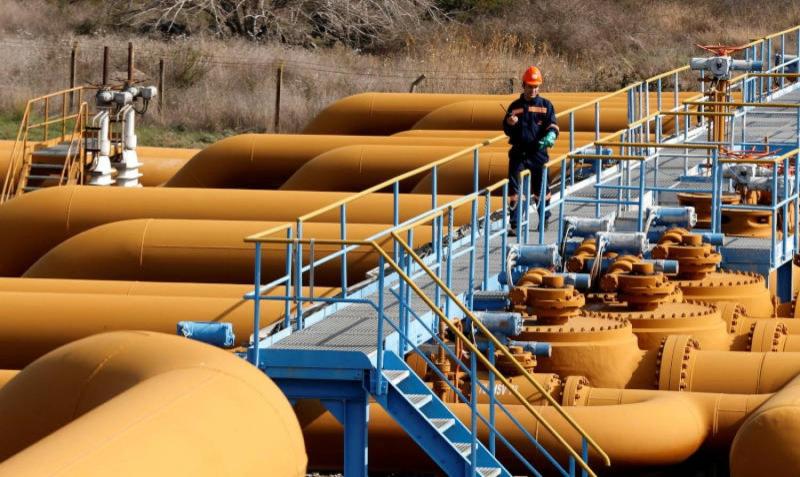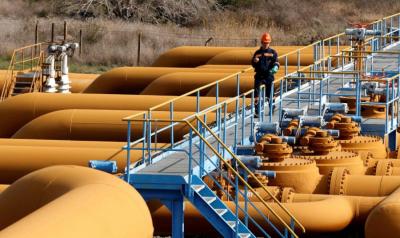Crude oil flow from northern Iraq to Turkey may resume this week after Baghdad announced it reached an "understanding" with Istanbul, following a halt in pumping for more than seven months.
Here are the outlines of the dispute over the pipeline:
**What Are the Latest Developments?**
During a visit to Erbil on Sunday, Iraqi Oil Minister Hayyan Abdel-Ghani expressed hope for an agreement with the Kurdistan Regional Government and foreign oil companies to resume production from the oil fields in the Kurdish region within three days, indicating a potential soon resumption of flow. Turkey stated last month that the pipeline was ready to start operations, but Iraq confirmed it had not received any official notification regarding the pipeline. A senior energy advisor told Reuters that Baghdad is waiting to resolve "outstanding financial and technical issues" before any resumption of operations.
**Why Is It Important?**
Although Iraq, the second-largest oil producer in OPEC, exports about 85 percent of its crude oil through southern ports, the northern route through Turkey still represents almost 0.5 percent of global oil supplies.
**What Led to the Closure?**
Turkey halted exports totaling 450,000 barrels per day through the export route in northern Iraq leading to the Ceyhan port on March 25, following a ruling by the International Chamber of Commerce. An informed source regarding the pipeline operations noted that this includes 370,000 barrels per day from the Kurdistan Regional Government's production and 75,000 barrels per day from the federal government's production. The International Chamber of Commerce ordered Ankara to pay compensation to Baghdad amounting to about $1.5 billion for unauthorized exports by the semi-autonomous Kurdish Government between 2014 and 2018. The Kurdistan Government's exports flow through its own pipeline to Fish Khabur on Iraq's northern border, where oil enters Turkey and is pumped to Ceyhan port along the Mediterranean coast. The Iraqi federal government asserts that the state-owned oil marketing company (SOMO) is the only entity authorized to manage crude oil exports via Ceyhan port. Turkey closed the pipeline to grant the federal government the right to control loading operations at the Ceyhan port. SOMO will need to instruct Turkey on loading vessels with shipments; otherwise, the crude will accumulate in the storage facilities with no means to transport it.
**What Are the Reasons for the Disputes?**
Iraq filed for arbitration in 2014 with the International Chamber of Commerce, based in Paris, regarding Turkey's role in facilitating oil exports from Kurdistan without the approval of the federal government in Baghdad. Iraq alleged that by transporting, storing, and loading oil from Kurdistan in Ceyhan without Baghdad's approval, Ankara and the Turkish state energy company BOTAŞ violated the 1973 Iraq-Turkey pipeline agreement. An informed source shared with Reuters that the International Chamber of Commerce ruled in March in favor of Iraq's right to control loading at Ceyhan port and to oversee what is being loaded. Three sources indicated that Turkey was also asked to pay 50 percent of the discount at which the Kurdistan Government's oil was sold. An informed source clarified that based on several rulings, the net amount owed by Turkey to Iraq is about $1.5 billion before interest. According to a Turkish source, Iraq initially demanded about $33 billion. The second arbitration case, which could take around two years, will cover the period from 2018 onwards. The Turkish government, as well as the governments of Baghdad and the Kurdistan region, have issued statements since the ruling, but none contained complete details about the decision. Additionally, the agreement governing the pipeline requires Baghdad to pump a guaranteed minimum of shipments through it, meaning Iraq will be committed to a minimum of payments to Turkey regardless of the amount of crude flowing, as long as the pipeline operates, which could complicate matters, according to an Iraqi official.
**Maintenance Work?**
Iraq stated in May that the suspension in March coincided with Turkey's request to inspect the pipeline and storage tanks for any damage caused by the devastating earthquake that occurred on February 6. The two countries agreed to wait until the completion of the pipeline maintenance assessment to resume flows while continuing the legal battle over the arbitration decisions. In April, Iraq filed a petition with a U.S. federal court to enforce the arbitration ruling from the International Chamber of Commerce. Ankara also mentioned last month that it was considering legal actions against Iraq. Turkey seeks to halt the lawsuit in the U.S. court, and the lack of progress in resolving this matter was among the reasons for the postponement of a scheduled visit by Turkish President Recep Tayyip Erdoğan to Iraq in August. Sources indicated that Erdoğan's visit to Baghdad would help resolve the issue, but this has not yet occurred. Turkish Energy Minister Alpaslan Bayraktar made a surprising announcement during an event in Abu Dhabi on October 2 when he stated that the maintenance was completed and that the pipeline would resume operations that week.




